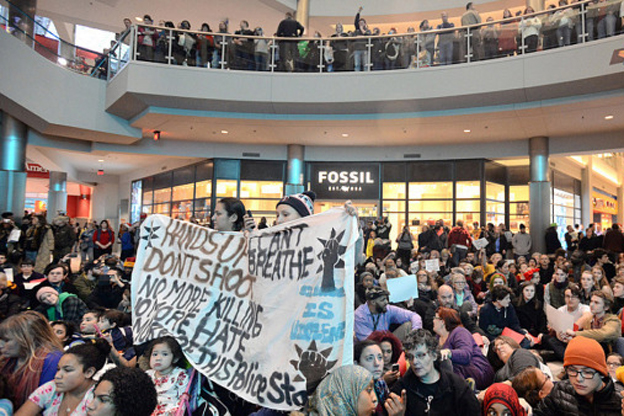
Bloomington Ten exonerated!
[Please see the update below]
Bloomington, Minn., June 1, 2069 – In a moving ceremony in a cramped suburban courtroom in Bloomington, Minnesota, the survivors and descendants of the Bloomington Ten were exonerated for their role in organizing, in 2014, a large, peaceful, and emotional rally in a shopping center that formerly existed in the town, the “Mall of America.” The rally was held to raise up to the public consciousness the rash of police homicides of black males around the country that had occurred that year.
The rally took place December 20, 2014, described as, “the busiest shopping Saturday of the year,” by Bloomington’s public prosecutor at time. This was during an era when “crimes against shopping” were well established in American law.
The Ten were convicted and sentenced to a term in jail, and they were ordered to pay crushing restitution of questionable police and mall costs, a burden from which many of the Ten never recovered. The prosecutor was motivated by a desire to “make an example” of the defendants.
The City of Bloomington was not represented by counsel at the hearing, but rather by its newly-elected mayor, John Brown. Mayor Brown asked permission to address the crowd at the hearing, which the judge allowed.
Brown apologized to the survivors and descendants of the Ten for the city’s role in crushing legitimate civil rights activity. One elderly survivor, with tears in her eyes, said, “Thank you.”
Mayor Brown turned to the judge and asked that the convictions of the Bloomington Ten be vacated, including the orders of restitution. Brown said that the city would refund the monies it received from the Ten.
The presiding judge, Judge Anthony Burns, banged his gavel loudly and said, “Granted.” The courtroom erupted with cheers and clapping. But rather than calling for order, the judge stood and clapped along with the others.
After the courtroom quieted, Judge Burns addressed the crowd, saying that it was never too late to redress historical wrongs, and that he was glad to be a part of redressing this one, regretting only that it took so long. “Every generation needs its civil rights champions,” continued Judge Burns, “and the champions of the last generation are the recruiters for the new ones.”
The self-aggrandizing “Mall of America,” where the rally was held in 2014, was pulled down about twenty years ago, with an elaborate ceremony to recognize what a colossal misuse of resources, both public and private, the Mall had been. At the site where the mall previously stood, there are parks, wetlands, and a new Bloomington Community and Arts Center. There is also a small flea market, satirically named, “The Mall of America,” that is held on weekends.
There is a movie in the works about the Bloomington Ten that will include the climactic courtroom scene.
– o O o –
Okay, this is obviously a fictitious story. But it’s based on this.
– o O o –
Update: And now, the Friendship Nine have had their convictions erased. This is the real story upon which my fictional account was based. From the linked Slate article:
The 1961 trespassing convictions of nine men who staged a sit-in at a Rock Hill, South Carolina lunch counter—the “Friendship Nine,” so named for the local college many of them attended—have been vacated by a judge. Writes Reuters: “Lawyers and a judge agreed it was time to correct the record to show that the group’s decision to stand up to racial injustice was not a crime.”
The men refused to post bail or have bail posted on their behalf and served 30-day sentences at a country prison farm. (For trespassing!) The attorney who represented then in 1961 also represented them in court today, and the judge who threw out their convictions is a nephew of the judge who first sentenced them. Eight of the nine men are still alive.
Further update: Here’s just a bit from from a story in The Atlantic:
On Wednesday, the eight surviving members of the Friendship 9 most of the nine men had been students at nearby Friendship College in 1961 were back in a Rock Hill courthouse to see their sentences vacated and their convictions overturned. “We cannot rewrite history, but we can right history,” Circuit Court Judge John C. Hayes III told the courtroom to high applause as he threw out the cases a poignant flourish given that Hayes’ uncle had originally sentenced the men in 1961.
As NBC News noted, the men “were represented in the hearing by Ernest A. Finney Jr., the same man who defended their case 54 years ago,” who later served as South Carolina Supreme Court’s first black chief justice since Reconstruction.
Same defense lawyer and a nephew of the sentencing judge. It doesn’t get much better than that.
Thanks for your feedback. If we like what you have to say, it may appear in a future post of reader reactions.


